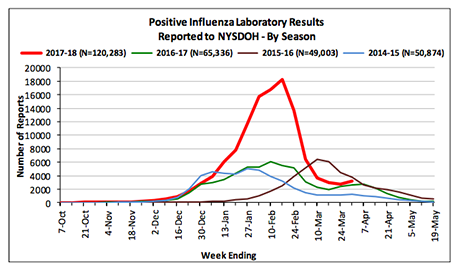Health Department reminds residents of the importance of flu shots
Press release:
National Influenza Vaccination Week (NIVW) is December 5-9, 2022. This is an annual observance in December to remind everyone that there is still time to get vaccinated against the flu to be protected during the upcoming holidays and winter months. “The best way to reduce your risk from seasonal flu and its potentially serious complications is by getting the flu vaccine every year,” stated Paul Pettit, Public Health Director for Genesee and Orleans County Health Departments (GO Health). “The vaccine lowers the chance of getting you and those around you sick with the flu. It also reduces the burden on the health care system by reducing doctor visits and hospitalizations.”
Everyone 6 months or older should get a flu vaccine every year. It's best to get the flu vaccine early on in flu season, ideally by the end of October. You might wonder, is it too late to get vaccinated? The simple answer is no. “Getting the vaccine later is better than not getting it at all,” said Mr. Pettit. “Once you have the flu vaccine, research shows that the vaccination reduces the risk of severe illness if you do get the flu.”
Vaccination is also important for people who live with or care for high-risk individuals to prevent spreading the flu to them. Individuals who are considered higher risk include younger children, pregnant people, people with certain chronic health conditions such as asthma, diabetes or lung disease, and people 65 years and older. Children younger than 6 months old are also at a higher risk of serious flu illness because they are too young to be vaccinated. People who care for or are around infants should be vaccinated to protect those that are vulnerable and cannot be vaccinated.
Below are the number of reported flu cases for Genesee and Orleans Counties since 2018, according to the New York State Department of Health. Note that there was limited flu reported in 2020-2021 and 2021-2022 compared to annual averages because of the heightened focus on practicing public health precautions such as frequent hand washing, social distancing, staying home when ill, limiting social gatherings, and wearing face coverings. During that period, less germs were spread due to people staying home and limiting their contact with others outside of their households as a result of the COVID-19 pandemic.
NYS Department of Health Confirmed Cases of Influenza
Genesee County
Orleans County
2018-2019
581
270
2019-2020
598
266
2020-2021
7
8
2021-2022
182
100
2022-2023 (as of 11/26/22)
212
93
In addition to receiving your flu vaccine, you can take preventative actions every day to help stop the spread of germs:
- Wash your hands often with soap and water. If soap and water are not available, use an alcohol-based sanitizer
- Avoid touching your eyes, nose and mouth
- Avoid close contact with people who are sick
- If you are sick, stay home and limit contact with others as much as possible so that you prevent the spread of infection.
- For flu, the Centers for Disease Control and Prevention (CDC) recommends that you stay home for at least 24 hours after your fever is gone except to get medical care or other necessities. Please note that stay-at-home guidance is different for COVID-19.
- Cover your coughs and sneezes with a tissue. Throw the tissue in the trash after you use it.
- Clean and disinfect frequently shared surfaces and objects
To find a vaccine site near you visit: https://www.vaccines.gov/find-vaccines/
For more information about Genesee and Orleans County Health Departments, visit GOHealthNY.org. You can also visit GO Health on Facebook, Twitter and Instagram by searching @GoHealthNY.

